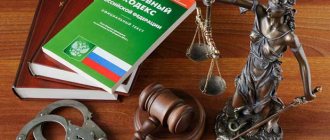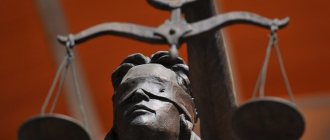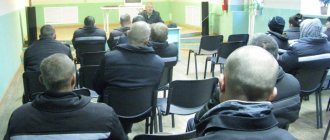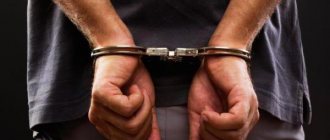All bodies and persons vested with rights and responsibilities in criminal proceedings, called upon to perform functions specified by law in initiating, investigating and resolving specific cases, are called participants in criminal proceedings.
They are classified according to their legal significance and function into main and other subjects of the process. The first group includes: the court, the prosecution and defense. Witnesses, experts, specialists, translators and witnesses play an auxiliary role in the proceedings.
Participants in criminal proceedings
Participants in criminal proceedings are persons taking part in it:
- Government bodies
- Official individuals
- Legal entities
Powers of participants in criminal proceedings:
- Performing a certain procedural and criminal function
- Possession of appropriate criminal procedural status
- Entering into legal relations with government bodies and officials carrying out criminal proceedings.
Participants in criminal proceedings:
- The court is the only body that administers justice
- Prosecution
- Defense side
- Other participants in criminal proceedings : witnesses, court secretary, specialists, experts, translators, etc.
Criminal justice authority
course work on this topic
Criminal law.
The general part is more detailed, only the court has the right to consider criminal cases and make sentences on the basis of which guilty persons can be subject to criminal punishment. And this power is granted only to courts of general jurisdiction. Are you an expert in this subject area?
We offer to become the author of the Directory Working Conditions Along with the responsibilities directly related to the administration of justice, these authorities must also monitor the legality and validity of the actions and decisions of law enforcement agencies.
The allocation of judges to an independent group of participants in criminal proceedings is due to the procedural function they perform in resolving the case.
When analyzing the specifics of the powers of the court, it is important to take into account that it also plays an important role at the stage of execution of sentences. This authority, for example, has the right to toughen the punishment in case of malicious evasion from serving it or to release the convicted person from prison due to illness.
Another type of control powers of the court concerns the consideration of complaints caused by the disagreement of interested parties with the investigative actions taken or the verdict passed.
At the pre-trial stages of the criminal process, the court has a real opportunity to actively eliminate the negative consequences of illegal and unreasonable actions and decisions of law enforcement agencies. Thus, the constitutional rights and freedoms of citizens are protected.
Finished works on a similar topic
Course work Participants in criminal proceedings 400 ₽ Abstract Participants in criminal proceedings 240 ₽ Test work Participants in criminal proceedings 250 ₽
Receive completed work or specialist advice on your educational project Find out the cost
In connection with the general characteristics of the status of the court in criminal proceedings, it should be noted that the law recognizes the high authority of its decisions (rulings, orders or sentences). After entering into legal force, they are subject to strict execution on the territory of the Russian Federation. We have already completed an abstract
Statehood of Russia. in more detail by all participants in legal proceedings, state authorities and local governments, public associations and officials. That is, court decisions are generally binding.
Figure 1. Participants in criminal proceedings. Author24 - online exchange of student work
Defense side:
- Suspect - a person against whom a criminal case has been initiated; who is detained at the crime scene; in relation to whom a preventive measure has been applied to bring charges
- Accused - a person against whom criminal prosecution is underway from the moment the charge is officially announced
- A defendant is someone accused of a crime from the moment his trial is scheduled until the verdict or acquittal takes effect.
- Defender - protects the interests of the accused or suspected of a crime
- Civil defendant - a person financially responsible for damage caused by a crime (parents, guardians, trustees, institutions or organizations)
- Representative of the civil defendant - lawyers, relatives and other representatives of the civil defendant representing his interests.
- Legal representatives of a minor suspect and accused - parents or one of the parents, guardians, adoptive parents, trustees, representative of the institution or organization in whose care he is
Legal status of participants in legal proceedings
Each subject of criminal proceedings has a certain legal status and performs a certain function. The division of functions in criminal proceedings serves to comprehensively consider the circumstances of the case and allows the court to make a fair, legal, informed decision.
The court is a special participant in the process. It is a body exercising judicial power with exclusive powers. Only a court can find a person guilty and determine his punishment. The court can also make decisions regarding the person under investigation:
- on the selection of a preventive measure;
- about placing him in a specialized medical institution for examination;
- about carrying out an inspection, search, or seizure of a home without the consent of the people living in it;
- seizure of property, correspondence;
- on restriction of the right to privacy of personal correspondence, telephone conversations, postal, telegraph and other messages;
- on the temporary removal of the accused from office.
Judges consider criminal cases individually, with the participation of jurors and lay judges, or by a panel of three professional judges.
Adversarialism is the most important principle of the criminal process enshrined in the Constitution. The defining point in it is the concept of side. A party is considered a participant in the process who represents interests protected by law in court and has procedural rights to protect them. Justice in criminal proceedings is achieved through giving the parties equal opportunities to achieve the desired result.
Prosecution
Prosecution refers to the activity of state law enforcement agencies, which consists in proving the guilt of a person prosecuted. The accusation can be state, public or private. The prosecution team includes:
- The prosecutor is the state prosecutor. His responsibilities include the implementation of criminal prosecution and supervision of the procedural activities of the inquiry and preliminary investigation bodies. Its function is to ensure the legality of solving a crime and preparing the case for consideration in court. He is a key figure in pre-trial proceedings in the case: he authorizes the initiation of a criminal case, monitors the progress of the preliminary investigation for the legality of investigative actions and compliance with the rights of the suspect and accused. The prosecutor supports the prosecution on behalf of the state in court: presents evidence of the guilt of the accused, gets acquainted with the arguments and evidence of the defense, criticizes them, and expresses his opinion on any legal issues.
- Investigator is a law enforcement official who conducts a preliminary investigation in a criminal case. Has procedural independence, makes all decisions on the case independently or acts with the sanction of the prosecutor. Its activity is to investigate a crime, evaluate it, identify and bring to justice those responsible.
- The head of the investigative department organizes and manages the work of the units subordinate to him, but can also conduct an investigation into a criminal case himself.
- The body of inquiry carries out a preliminary investigation, as well as urgent investigative actions to establish and consolidate traces of a crime.
- Victim is a citizen or organization that has suffered harm as a result of a crime. The state provides the victim with protection of violated rights and compensation for harm caused. He has the right to participate in investigative actions, get acquainted with the results of the preliminary investigation, participate in court hearings in all instances, and appeal the verdict.
- A private prosecutor is a person who initiated criminal prosecution through a private prosecution with his complaint, and his representative. He is endowed with the rights of the victim and certain rights of the public prosecutor.
- A civil plaintiff is a person who has suffered material or moral harm from a crime and has filed a claim for compensation. A civil plaintiff has the procedural position of a victim.
- Representatives are called upon to provide participants in legal proceedings with assistance and assistance in realizing their rights and interests. In criminal proceedings, a participant in the process and his representative may be present and carry out procedural actions together. Representation can be legal and by agreement. In the first case, the representative is obliged to do this by virtue of the obligation imposed on him by law, in the second - he acts by virtue of the concluded agreement.
The accusation plays a vital role in criminal proceedings. Its goal is to stop crimes, expose criminals, and ensure the inevitability of punishment for the guilty.
Defense side
Judicial defense is a set of procedural actions aimed at refuting the accusation or mitigating the punishment for the accused or defendant. Participants in criminal proceedings on the part of the defense include all persons whose function is to defend against the prosecution:
- A suspect is a person against whom a criminal case has been initiated based on information about the possibility of him committing a crime. If detained, he must be charged within 48 hours, and if arrested, within 10 days, after which he receives the status of an accused. The suspect is endowed with procedural rights that ensure his protection already at the stage of preliminary investigation.
- An accused is a person who has been formally charged with committing a crime. Compared to a suspect, he has a wider range of rights to defend himself against charges. If the suspect or accused has not reached the age of majority, his legal representatives are involved in the process.
- A defendant is a person brought to trial on charges of a crime. In a court hearing, he is a party: he has the same rights as the accuser, and can use all means of acquittal permitted by law.
- A defense attorney is a person who provides legal assistance to a suspect, accused, or defendant in criminal proceedings. Allowed to participate in a case from the moment of detention, arrest or indictment. A lawyer, a representative of a public organization, as well as close relatives and legal representatives of the accused can act as a defense attorney.
- A civil defendant is a person who is financially responsible for property damage caused by a crime. Acts as an independent participant in the process only in cases where, according to the law, he is responsible (in whole or in part) for the actions of the accused. In other cases, the accused bears responsibility himself. A civil defendant can exercise his procedural rights independently or through his representative; the law allows for their joint participation in the case.
Adversarialism is a tool for the implementation of justice and the protection of human rights and freedoms.
Other participants
Persons who have no interest in its outcome and who assist the court in administering justice also participate in criminal proceedings:
- A witness is a person who has information that helps establish the circumstances of the case. The witness is irreplaceable and cannot be disqualified; he is obliged to appear when called and give full and truthful testimony. Has witness immunity - the right not to testify against oneself and one’s loved ones.
- An expert is a professional appointed to conduct a forensic examination. His testimony and expert opinion are evidence in the case.
- A specialist is a person who has special knowledge and is engaged by the court to assist in the discovery, securing and seizure of objects and documents that serve as evidence in the case.
- Witness - is invited to participate in a procedural action in order to certify its correctness and legality. When performing such an action, the presence of at least two witnesses is required.
- An interpreter is involved if during the process there is a need for knowledge of a foreign language or sign language.
All these persons are involved by the court to establish the truth in the case under consideration. They are responsible for deliberately misleading the investigation and the court.
Prosecution:
- A prosecutor is an official authorized to carry out criminal prosecution on behalf of the state and support the state prosecution in court.
- Investigator - carries out preliminary investigation in a criminal case
- Head of the investigative body
- Inquiry bodies - authorized to conduct inquiries
- The head of the inquiry unit is the official who heads the unit carrying out the preliminary investigation in the form of an inquiry.
- Investigator - carries out preliminary investigation
- Victim - an individual who has suffered physical and material harm as a result of a crime, as well as a legal entity who has suffered damage to property and business reputation
- Private prosecutor - a person who filed an application to the court in a criminal case of private prosecution
- Civil plaintiff - an individual or legal entity who has filed a claim for compensation for property damage
- Representatives of the civil plaintiff, victim and private prosecutor are lawyers, one of the close relatives of the victim or civil plaintiff, or another person for whose admission the victim or civil plaintiff applies.
Some important points
It is important to understand that criminal law protects not only public relations, that is, it is public, but also private rights and private interests. Well, look. There is terrorism. It is clear that there is a public interest here - the safety of society. But the lives of specific people are their right to life. Terrorists violate these rights, which means they encroach on private interests.
So, in any criminal case there are four possible options for combining private and public interest. At the same time, the prosecutor acts on the side of protecting public relations. And on the side of private relations, there is a private prosecutor. And in theory, if the court comes to the conclusion that only private interests have been violated, then the prosecutor is removed from the case and the case can be dropped.
So the options:
- The first option is when both public and private interests are violated. For example, cases of theft and theft. Here, of course, damage has been caused to the institution of private property, but the property of the victim itself - his property rights - is his personal interest. In such a case, the public prosecutor will play the main role, and the private prosecutor will have a place to be.
- The second option, in which damage is caused only to public interest. For example, these could be cases involving illegal financial and economic transactions, theft of money from the country's budget, etc. There is not and cannot be a private prosecutor.
- Third option. In such cases, only private interests are violated. For example, this is a case of beating, causing harm to the health of another person due to beatings, etc. The prosecutor is not involved here, but only a private prosecutor.
- The fourth option is when private rights and interests are violated, but the prosecutor gets involved in the case.
I think now the role of each participant in the criminal process has become clear to you.
Your task is to write in the comments examples of criminal cases for all four options for the relationship between public and private interests with references to the Criminal Code of the Russian Federation. Share on social media networks
Example assignment
Establish a correspondence between the participants and the parties to criminal proceedings: for each element given in the first column, select the corresponding element from the second column.
| ACTIONS | PARTIES TO CRIMINAL PROCEEDINGS |
| A) prosecutorB) investigatorC) accusedD) defense attorneyD) investigator | 1) defense side 2) prosecution side |
Write down the numbers in your answer, arranging them in the order corresponding to the letters:
| A | B | IN | G | D |
| 2 | 2 | 1 | 1 | 2 |
Note: on the website you can find material about the participants in the civil process.







